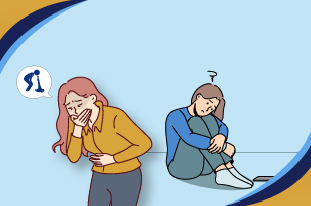Have you ever felt that something has taken over your life, and that something has robbed you of self-control? This could be a mental condition called obsessive-compulsive disorder (OCD), which is characterized by its symptoms, called obsessions and compulsions. If you are an enthusiastic reader or want to be one, OCD can put a snag on that wish. Let’s talk about OCD and reading in the words below while discussing how you can become an OCD reader.
Defining OCD
OCD is a mental condition that is characterized by (as mentioned) its symptoms. These are called obsessions and compulsions. Obsessions are persistent, uncomfortable, and intrusive thoughts that can only be relieved by participating in related or weird compulsions to reduce stress (as the affected individual thinks that if they do not dwell on these compulsions, something worse related to a fear of their obsessions will come to life). People with OCD have a knack for latching on to seemingly simple everyday tasks and turning them into time-sucking, anxiety-inducing activities. It is very different from something like PTSD, which is more based on trauma.
OCD is kind of an itch that needs to be scratched by the affected individual, and as you may have guessed, scratching makes it worse. This vicious cycle keeps its symptoms as obstacles and can include reading OCD. But its frequent symptoms (which are often time-consuming and significantly impact quality of life, which in a way is similar to bipolar disorder, as its episodes also eat up a lot of time and impact quality of life) are:
Obessions
Can be of a wide range, but these are some of the most common ones:
- Fear of hurting someone or yourself, whether
- Fears and doubts relating to relationships
- Fear of contamination
- Past related trauma
- Fears and doubts related to sexual orientation
- Obsession with coming out as blasphemous
- Fixating on bodily sensations and movements
Read More: Which Brain Region Is Believed to Play a Critical Role in OCD?
Compulsions
To get rid of the intrusive thoughts that are part of obsessions, affected individuals employ compulsions that are essentially repetitive behaviors. Some of the most common ones are mentioned below:
- Excessive cleaning
- Excessive hand washing or sanitizing use
- Checking things, for example, to see if the doors are locked
- Employing avoidance behavior for certain places, people, or situations
- Replacing bad thoughts with good ones
- Suppression of thoughts
- Overthinking and rumination
- Counting things such as steps
OCD and Reading: A Discourse
OCD reading is a thing. When you have OCD, it can be difficult to do simple things such as reading. OCD is all about irrational uncertainty and anxiety. When you read a book while suffering from OCD, you always end up thinking that you must’ve missed something or you did not fully understand it. So, to be completely certain, you reread it. It doesn’t matter whether it’s a book, a piece of writing, or even a sign.
The Psychological Reasoning Behind Reading OCD
It becomes an OCD reading thing when the type of uncertainty we just described becomes intrusive and extremely persistent. Behavior like this triggers intrusive thoughts, fears of making mistakes, or a need for everything to feel “just right” to remove that uncertainty. OCD and reading here becomes reading OCD, which is essentially an offshoot of OCD, a broader manifestation of the compulsive behavior that is found in it. According to one study, “patients with OCD may be more likely to repeatedly read the same text because of comprehension difficulties caused by either obsessions or compulsions” (Abramovitch, Abramowitz & Mittelman, 2013).
Read More: Do You Ever Wonder That Your OCD Thoughts Are Not Real?

Can OCD Impact The Way You Read?
There are many different ways your reading can be impacted when you are affected by OCD. Let’s talk about some of these:
OCD and Reading Obsessions
Reading comprehension
Some OCD sufferers will create obsessions around reading. Some of them will have obsessions related to reading comprehension, specifically. When you have this type of reading OCD, you ask say things like “If I don’t digest all the information in my textbook perfectly, I’ll fail my test.”, or ask questions like “What if I don’t re-read my boss’s email and I miss a task and get fired?”.
Reading triggers
Sometimes, OCD does not start specifically due to reading, but is a subtype of OCD. For example, you are reading a novel that speaks some harsh truths about abusive relationships and suicidal ideation, which can trigger your harm OCD, where obsessions and compulsions are always about how you might harm yourself or another person, whether deliberate or not.
Read More: Understanding OCD Groinal Response: Unraveling the Misunderstood Symptoms
OCD and Reading Compulsions
Re-reading
It is normal to reread something, as many of us may not get something that we read on the first go. But with OCD, reading that is done again and again gets out of hand. In OCD, people may struggle with reading because they feel that they need to re-read pages, passages, sentences, or even words, a certain number of times before they allow themselves to move forward.
Specific reading patterns
This can shape up as something like you are reading pages in odd numbers and doing something else that feels satisfying for your OCD itch.
Avoidance
This is another one of OCD and reading compulsions, where you start to avoid reading materials that trigger you or where you feel a need to reread something for one reason or another.
Checking
Here, you might reread a certain passage to see how it made you feel the first time around. You do this consecutively and persistently.
Read More: OCD in relationships: Understanding, coping, and supporting each other
Treating Rereading OCD
There are many ways this type of OCD, such as psychiatric medication management (which works well for something like depression), can be treated, as all of them can work if they do for normal OCD. The most suitable one is exposure and response prevention (ERP) therapy, which is a form of psychotherapy. It helps break the cycle of obsessions and compulsions by making you learn how to address your fears head-on, while helping you resist the urge to engage in compulsions. Lifestyle changes such as exercising and a good sleep pattern also help and complement other treatment methods that we have talked about.
Wrapping Up!
We have formed a link between OCD and reading, and it is up to you how to get it treated. You can get treatment from our mental wellness center, Orange Coast Psychiatry, which is not only adept at treating OCD but can help with other conditions such as schizophrenia or psychosis. Additionally, we also offer alternative treatment methods like telepsychiatry.

















